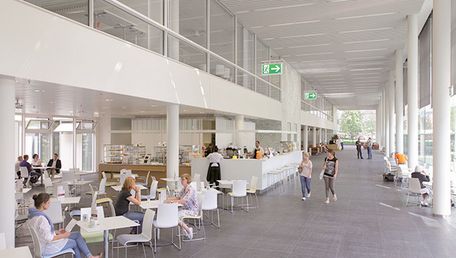Key research areas
- Regulation of myocardial circulation and oxygenation
- Cardiovascular effects of nitrogen monoxide
- Myocardial metabolism (e.g. myoglobin, energy metabolism, hibernation, preconditioning, ischaemia and reperfusion)
- Generation and phenotypical analysis of transgenic animals
- Functional genomics and proteomics
- MR and sonographical imaging for non-invasive analysis of cardiac morphology and the contractile function
Physiologists research and describe the functions of organisms and attempt to understand them in their entire complexity. Düsseldorf University Hospital’s physiologists are currently engaged in examining gene and protein expression at the molecular level and in analysing individual cells or organs through to studying entire organisms. Functional principles are often first analysed in cellular models or animal experiments in order to then investigate the applicability of the relevant findings to humans.
One of the key research areas of the Institute of Cardiovascular Physiology is interaction between blood circulation and metabolism in the heart, which normally ensures an adequate supply of oxygen and is disrupted in the case of a heart attack for example. This involves numerous factors – including local hormones such as adenosine and nitrogen monoxide (NO), but also neurohumoral control. These factors are analysed in numerous projects by means of biochemical and molecular-biological methods and magnetic resonance-spectroscopic techniques (MRT).
The development of transgenic animal models has gained particular significance in this context. In this field, physiologists have already succeeded in specifically excluding or increasingly forming individual proteins.
Research and teaching
Cardiovascular physiologists are considerably interested in metabolic functions in the cardiac area. For example, they have extensively described adenosine metabolism which is involved in regulating myocardial circulation. Furthermore, using NMR-spectroscopic methods, they have examined its relation to cardiac adenine-nucleotide metabolism. Since discovery of the significance of nitrogen monoxide for vasodilation, the influence of this mediator on the function of the heart, the development of arteriosclerosis and thrombosis is being investigated in a series of projects.
Another of the Institute’s fields of research involves harmonisation of the supply and demand of energy at isolated cardiomyocytes and at the heart and protection of the ischaemic myocardium. Furthermore, the spatial distribution of myocardial circulation, metabolism and gene expression, which sometimes feature surprising patterns, are currently major fields of research.
Over the last few years, the generation and phenotypical analysis of transgenic mouse mutants have been a key focus of the Institute’s research activities. It has been possible to characterise the diverse roles of the formation of nitrogen monoxide (NO) in such animals, also enabling the significance of NO in cardiac hypofunction to be specified more precisely. Mice which form insufficient myoglobin show, for example, a change in molecular network and morphological structure as a reaction to the loss of a major gene product. The Institute’s current work substantiates the significance of myoglobin not only for oxygen transmission but also for the metabolisation of NO and free radicals.
Integrative analysis of the cardiovascular phenotype of transgenic mice requires numerous mutually supplementing approaches which, during the past few years, have been established on an internationally competitive level. Hence, in Düsseldorf, cardiac morphology and functioning by means of high-resolution magnetic resonance imaging (MRT and MRI) and echocardiography, for example, are being analysed on mice. The telemetric surveillance of transgenic mice’s arterial blood pressure is also possible. Funding has provided the Institute’s cardiovascular physiologists with the equipment required for such extensive phenotypical analysis. The Institute also receives financial support from the University’s Biomedical Research Centre.
The Institute of Cardiovascular Physiology is also involved in lead management of special research sector no. 612 “Molecular Analysis of Cardiovascular Functions and Functional Disorders”.
Physiology is one of the three classic cornerstones of preclinical training in human medicine. Students are trained through interharmonised lectures, practicals and seminars involving teaching not only on the cardiovascular system but also on the respiratory system, blood, renal physiology, balance between acids and alkalis, and nutrition. Special sessions are geared to pharmacy students.
The Institute is involved in developing a multimedia learning system on “coronary cardiac disease” in which its scientists present the entire physiology and pathophysiology of the heart in an attractive context using animations, video and audio sequences and mathematical model simulations. Düsseldorf University Hospital’s cardiovascular physiologists promote notebook-aided teaching in order to improve student access to electronic media and academic databases.
Teaching (for students of human medicine, dentistry and pharmacy)
Vegetative physiology, i.e. cardiovascular physiology, blood, respiratory system, kidneys, balance between acids and alkalis, nutrition and digestion
More information
Visit this site under: Institut für Herz- und Kreislaufphysiologie





